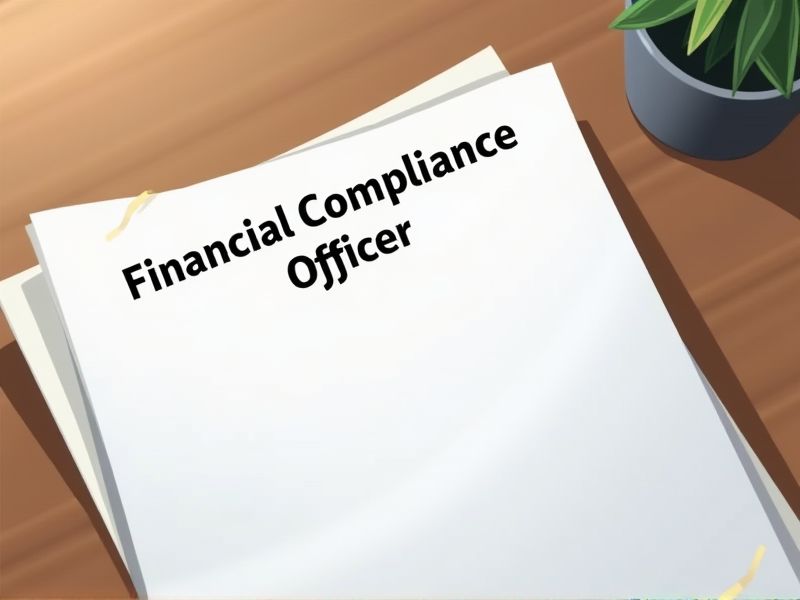
Financial compliance officers play a crucial role in ensuring that financial institutions adhere to regulatory standards, minimizing the risk of legal penalties and enhancing institutional integrity. Certifications provide these professionals with the necessary expertise to interpret complex regulations and apply them effectively within their organizations. They also demonstrate a commitment to maintaining high ethical standards, which is vital in fostering trust with stakeholders and clients. Some important certifications for a Financial Compliance Officer include CAMS, CRCM, and CCEP.
Certified Regulatory Compliance Manager (CRCM)
Certified Regulatory Compliance Managers (CRCM) hold an understanding of ever-evolving financial regulations, crucial for mitigating compliance risks. Financial institutions face increasing scrutiny and penalties; a CRCM ensures adherence to these standards, reducing potential liabilities. Certification validates the expertise of compliance officers, demonstrating a commitment to ethical practices and regulatory awareness. Organizations with CRCMs can enhance their reputation and credibility, fostering trust with stakeholders and customers.
Certified Anti-Money Laundering Specialist (CAMS)
Certified Anti-Money Laundering Specialist (CAMS) certification equips Financial Compliance Officers with essential knowledge of regulatory frameworks, enhancing their ability to identify and mitigate risks associated with money laundering. Enhanced expertise aids in protecting institutions from reputational damage and potential financial penalties. CAMS certification signifies a commitment to upholding industry best practices, fostering greater trust among clients and regulatory bodies. This specialized skill set positions officers to effectively contribute to the compliance team's overall efficiency and effectiveness.
Certified Fraud Examiner (CFE)
Hiring a Certified Fraud Examiner (CFE) enhances a Financial Compliance Officer's ability to recognize and investigate fraudulent activities, minimizing financial loss. CFEs possess specialized skills in understanding the complexities of diverse fraud schemes, which fortifies the compliance measures within an organization. Their expertise in fraud risk assessment helps in designing effective internal controls, ensuring adherence to relevant regulations and standards. A CFE's insights contribute to fostering a culture of integrity and ethical decision-making within the financial operations of a company.
Certified Compliance & Ethics Professional (CCEP)
The financial sector faces complex regulations, requiring a Compliance Officer to navigate effectively; a CCEP certification provides the necessary specialized knowledge. Regulatory scrutiny in financial institutions demands adherence to ethical standards, which a CCEP equips professionals to uphold. This certification enhances a Financial Compliance Officer's credibility, signaling advanced competence in compliance and ethics to stakeholders. With evolving financial regulations, a CCEP-certified officer remains current, reducing the risk of non-compliance penalties.
Certified Financial Services Auditor (CFSA)
Certified Financial Services Auditors (CFSAs) possess specialized knowledge in auditing and financial services regulations, which enhances their ability to identify and address compliance issues effectively. Their expertise ensures organizations adhere to industry standards and legal requirements, reducing the risk of financial penalties and operational setbacks. Organizations with CFSA-qualified professionals often experience improved internal controls, contributing to stronger financial health and trustworthiness. The credential signifies a commitment to upholding ethical standards and continuous improvement in the financial services sector.
Certified Risk and Compliance Management Professional (CRCMP)
The increasing complexity of financial regulations demands a deep understanding, which the CRCMP credential provides, enabling officers to navigate regulatory landscapes effectively. Holding a CRCMP indicates mastery in risk assessment and compliance, which is crucial for safeguarding an organization against legal and financial penalties. Organizations value CRCMP-certified professionals as they bring evidence-based strategies and approaches that promote best practices in compliance management. With a CRCMP, a Financial Compliance Officer demonstrates enhanced credibility and commitment, fostering trust among stakeholders and regulators.
Financial Risk Manager (FRM)
Financial compliance officers ensure that organizations adhere to financial regulations and laws. The complexity of financial markets introduces a wide range of risks, necessitating expertise in risk identification and management. A Financial Risk Manager (FRM) specializes in evaluating and mitigating these financial risks, providing in-depth analysis and strategic solutions. Their expertise directly supports compliance efforts by aligning risk management strategies with regulatory requirements, thus enhancing the organization's ability to remain compliant.
Certified in Risk and Information Systems Control (CRISC)
Financial compliance officers require rigorous understanding of risk management, which the CRISC certification provides through comprehensive knowledge of risk identification and assessment. This certification equips officers with the skills to implement and oversee information systems controls, crucial for maintaining financial data integrity. Regulatory environments demand precise risk mitigation strategies, which CRISC-certified professionals are trained to deliver. Organizations trust CRISC holders to ensure compliance, reducing the likelihood of costly legal liabilities.
Certified Information Systems Auditor (CISA)
Financial Compliance Officers require Certified Information Systems Auditor (CISA) certification to ensure the integrity and security of financial systems. CISA helps officers identify vulnerabilities and implement controls, reducing the risk of fraud and data breaches. The certification provides a deep understanding of regulatory requirements, aiding compliance with laws like Sarbanes-Oxley. Having expertise in auditing information systems enhances confidence among stakeholders in a company's financial practices.
Chartered Financial Analyst (CFA)
The Chartered Financial Analyst (CFA) credential equips Financial Compliance Officers with a comprehensive understanding of investment analysis and financial markets, which is vital for identifying and managing compliance risks effectively. The rigorous curriculum of the CFA program ensures that compliance officers have strong ethical foundations, critical for upholding integrity in financial practices. Employers value the CFA designation as it signals a high level of competence and commitment, enhancing the trustworthiness of a compliance officer's decisions. The global recognition of the CFA charter also facilitates better understanding and enforcement of international financial regulations.
Summary
When you, as a Financial Compliance Officer, earn relevant certifications, your expertise in managing regulatory requirements enhances significantly. This often leads to increased trust from employers and colleagues, positioning you as a key asset in your organization. Such certifications typically result in expanded career advancement opportunities, potentially increasing your earning potential. Overall, your ability to safeguard the organization against financial risks becomes more robust.
